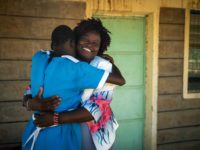Your curiosity about out country staff is exciting, and again we have 10 questions that will inform and inspire you to help fight for children in poverty.
We asked Roberto Medrano, communications and trips specialist for Central America and the Caribbean and a member of our El Salvador staff, to answer some of your questions.
1. I just found out that one of my sponsored children has been sponsored four times in the past six years. I was wondering what type of effect this has on children. Do they get to the point where they are not even excited to be sponsored anymore? Is this a common occurrence? (Cindy)
To be completely honest, yes. Some of the children have received the sad news several times that their sponsors canceled. If that has happened several times, the children think something is wrong with them.
It is amazing the influence a sponsor can have on the child. For example, I remember a 25-year-old Compassion graduate. She is a Christian who is married and has two babies. She also serves as a center worker. Even though she is an adult and loves Compassion’s ministry, she always cries because in the 15 years of sponsorship her sponsor did not write one single letter. She wrote her sponsor dozens of letters, but she never received any response.
2. What are the great things about El Salvador that you want us to know about? Tell us about a particular strength or something special about the people of your country. (Lisa Miles)
El Salvador is the smallest country in the Americas, but our people have a great heart. In Central America they call us the smiling country, and I think that is a special thing about our people. We have faced earthquakes, hurricanes, civil war, and poverty, but in any problem if you ask a Salvadoran, “How are you doing?” he or she will say with an honest and warm smile, “It’s all good!” Our people are very positive and enthusiastic, and they have warrior hearts that can overcome any disaster or negative situation.
3. In light of the global food crisis, which would be the most important option for sponsors who want to help — to sponsor an additional child, to send a family gift to your child, or to send a donation to Compassion specifically for the food crisis? (Lindy)
I think that everything you mention has a big impact on the crisis. I think it depends pretty much on the kind of impact you want to make.
- Sponsor a child. Great! He or she will not only receive a physical opportunity but a life opportunity that can change his or her life and his or her family’s life
- Send a gift. That certainly will focus the impact on one family that urgently needs the help.
- Send a donation. That will allow us to direct the funds to the countries, communities, and villages that have been most affected by the food crisis.
4. What are some of the struggles the children face that are specific to El Salvador? (Melissa Coast)
- Gangs: 75 percent of the crimes are committed by the gangs, and, just to give you an idea, in a country slightly larger than Massachusetts about 12 murders are committed daily. To make the situation even worse, gangs look for new recruits among children.
- Abandonment: Due to the economic situation in El Salvador, thousands of parents leave the country; about two million Salvadorans live in the United States. Hundreds of thousands of children live without a mother and a father and make their way to gangs even easier because they think the gang can be the family they don’t have.
5. I understand that some countries that Compassion partners with have the children write four letters per year. Other countries allow the children to reply to each letter the sponsors write. How does this process work in El Salvador? (Lauren)
Actually, El Salvador was a pilot country for “reciprocal letters.” This was a pilot program that involved relatively immediate responses when the child received a letter.
6. I would like to learn from your opinions regarding the condition of the American Christian church. (Compassion Dave)
I think in my case and most others, Salvadoran Christians are very grateful to the United States because they sent hundreds of missionaries to spread the gospel in El Salvador one hundred years ago. At that time, they suffered a lot and worked very hard to spread the gospel in a very rough and unfriendly environment.
Now 35 percent of our population is evangelical and the president of the country gathers pastors to openly pray for the country and the government. I think we owe much of this to those American missionaries who left everything to come to our country.
7. Can you tell the story of the sponsor trip that moved you the most? How can sponsors best prepare for their sponsor trip and meeting their child? (Sara Benson)
All sponsor trips are amazing experiences for the sponsors and for the sponsored children.
I remember a child by the name of Magaly. She was a 15-year-old girl who was sponsored by an American couple. When Magaly met them in person, she hugged them effusively while big tears came out from her beautiful brown eyes, and she kept repeating, “My family, finally I meet my family.”
At the end of the meeting Magaly took a old little purse from her bag and showed the picture they sent her years ago. She said, “You know, I have your picture with me always, and I have said to all my friends at school that you are like my parents, that you are my family.”
The couple started crying as they looked at each other. They were married for 18 years and they could not have children, so they started sponsoring Magaly when she was 5 years old. They saw her as their Salvadoran child. Their biggest dream was that Magaly would see them and value them as family.
I think that for a sponsor trip you have to be ready to give. You have been in the dreams of your sponsored children. Meeting them will have an amazing impact on their lives. Make good use of your influence on them, tell them they can do anything in Christ. Encourage them to study, to keep attending the project.
8.What is the poorest area of El Salvador? And is there any way to sponsor a child from the area? (Heather)
The West. You can contact a Compassion representative at (800) 336-7676, Monday through Friday, 7 a.m. to 5 p.m. to sponsor a child from this region.
9. What happens to children who start their education late, when they are first sponsored, and do not graduate by the time they reach the age to leave the Compassion program? (Juli Jarvis)
Since the moment they are registered, Compassion plans ahead so that they have the opportunity to finish school. Salvadoran children are registered from 3 to 7 years old, which gives the child development centers enough time to plan the child’s education.
10. I would love to hear your favorite stories of children in your programs whose lives were really turned around by being part of Compassion. (Amy)
I know several stories and each one of them is precious to me. Maybe the most special one was the first one.
I had only been working with Compassion four days when I went on my first child development center visit. There, I met a 9-year-old sponsored boy who was leading the worship at the center. He was FULL of joy, jumping and dancing.
Then he started preaching, and I must confess that child preachers really touch my heart because I was a child preacher when I was young. When I find a child preacher it is like finding a much-loved colleague.
The name of the boy I met in the child student center was Pedro Julio. His story was quite different than mine.
When I preached as a child, my parents were seated at the first row of the church, and they were Christians. Meanwhile, when Pedro Julio was preaching, his dad was in jail and his mom was doing drugs in a town far from where Pedro Julio lives.
When they invited me to preach, my mom took care of the clothing I was going to wear, my dad drove us to the church and he gave BIG HUGS to me before I started preaching.
When Pedro Julio preached at the center, he wore the only clothes he had, the ones the center gave him — except for the shoes of course. Wearing shoes for him was too troublesome and uncomfortable.
Instead of having his dad drive him to church and giving him big hugs, he had a disabled grandmother who could not move from bed. How have they survived?
Pedro Julio sometimes worked doing errands for people at the market, and the grandmother sometimes received the help of one of her daughters.
In spite of Pedro Julio’s hard life, when he was preaching I felt we shared so much. The same joy in our eyes, the same pride in our hearts because we were serving the Lord, the same redeemer who saved us.
Our childhoods were very different, but yet they were the same. We both met Jesus as children, we both had hope for the future, we both received love at church and we had plans to be serving the Lord for a long time due to all the wonderful things he had done in our lives.
That happened six years ago, and I still remember Pedro Julio. He made me realize that Compassion was a ministry designed in heaven because it reaches children with no hope and makes them able to bless the name of the Lord in the middle of poverty, crime, violence, abuse and abandonment.







8 Comments |Add a comment
I love this post! In the first answer where it says, “Even though she is an adult and loves Compassion’s ministry, she always cries because in the 15 years of sponsorship her sponsor did not write one single letter.” It brakes my heart too. If it is possible, could you please tell her that I love her? (I figure it is probably not possible, but I just hope she knows she is loved.)
Great post, though 🙂
great insightful questions and thoughtful discussion. Chad, thanks for running this piece. good job.
Thanks for answering our questions and of course mine! 🙂 I always prefer to sponser the poorest of the poor for some reason..God Bless you in El Salvador!!
Thank you and God bless you, Roberto!
I’m beginning to think I want to go on some sponsor tours just to meet the country staff — you all are so inspiring to me!! It warms my heart to know that our children are with such wonderful people.
I love the idea of “warrior hearts.” It perfectly describes what God gives us to be courageous and persevere. I love that.
God bless you and all of the children in El Salvador!
Thank you Roberto! It’s such an honor to have had the opportunity to read the responses to the questions we’d asked — thanks for taking time to do this for us!
@ Tina — I have a child in Guatemala (Cotapeque area) and she responds to each of my letters. My child in El Salvador has also replied to all of my letters as well, she’s newer for me though. I’ve sponsored my child in Guatemala for several years now. 🙂 I hope you will hear from your child soon!
What a joy to read more about children and Compassion projects in another country! Thank you for sharing what a big impact sponsors have on children and their families. Magaly’s story is so poignant! God bless you and the work you are doing.
Great answers! I really enjoyed reading them. Question #5 has me intrigued, though. With my children in the Philippines, I tend to get “reciprocal” letters. With the ones in Guatemala and the Dominican Republic, I get the standard 3 letters per year. Do the methods of replying to letters vary by country? If so, which countries use the reciprocal method, and which follow the standard 3 letters a year method?
Sorry for the long question!
What great questions and answers! Do you happen to have an update on Pedro? I’m sure there are hundreds (or thousands) of Pedros out there though — which is why we need more sponsors!